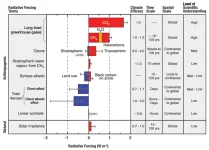- Joined
- Jul 19, 2012
- Messages
- 14,185
- Reaction score
- 8,768
- Location
- Houston
- Gender
- Male
- Political Leaning
- Libertarian
In the journal Science a group of investigators explains why computer models of the atmosphere are likely to be inaccurate in predicting future climate.
Climate Effects of Aerosol-Cloud Interactions
The authors go on to say that it will be "many decades" before computer models have the skill to accurately take aerosols and clouds into account globally and on an extended time scale.
ht: hockeyschtick.blogspot.com
Aerosols counteract part of the warming effects of greenhouse gases, mostly by increasing the amount of sunlight reflected back to space. However, the ways in which aerosols affect climate through their interaction with clouds are complex and incompletely captured by climate models. As a result, the radiative forcing (that is, the perturbation to Earth's energy budget) caused by human activities is highly uncertain, making it difficult to predict the extent of global warming. Recent advances have led to a more detailed understanding of aerosol-cloud interactions and their effects on climate, but further progress is hampered by limited observational capabilities and coarse-resolution climate models.
Climate Effects of Aerosol-Cloud Interactions
The authors go on to say that it will be "many decades" before computer models have the skill to accurately take aerosols and clouds into account globally and on an extended time scale.
ht: hockeyschtick.blogspot.com

